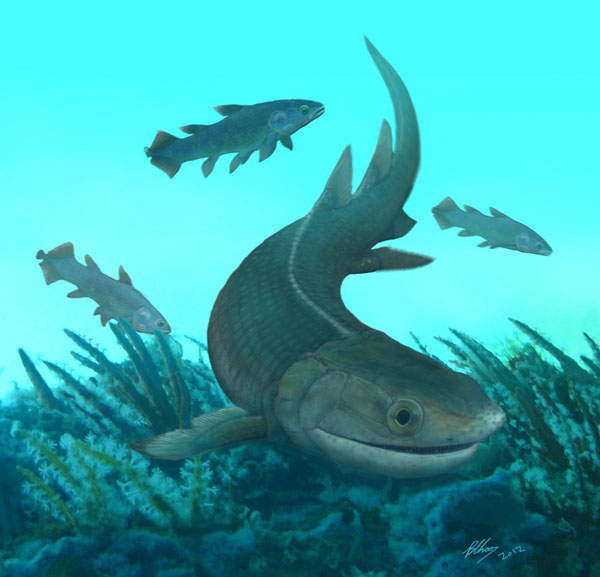China discovers earliest 4-legged animal fossil
Updated: 2012-10-25 06:55
(Xinhua)
|
|||||||||||
BEIJING - Chinese scientists have unearthed a skull fossil of a fish-like stem-tetrapod that could extend the earliest record of tetrapods by some 10 million years, according to a research paper published Tuesday in the online journal "Nature Communications."
The stem-tetrapod, discovered in southwest China, will increase scientists' understanding of the fin-to-limb evolutionary transition, the paper said.
 |
|
The Chinese Academy of Sciences released a computer generated image of the stem-tetrapod. [File Photo/Xinhua] |
Living tetrapods, such as frogs, turtles, birds and mammals, comprise just one subgroup of the tetrapod superclass, which also includes finned and limbed stem-tetrapods.
Some stem-tetrapod species are believed to have moved onto land about 370 million years ago and gradually evolved into the earliest terrestrial vertebrates and eventually humans.
Previously, there was a gap of at least 16 million years from the oldest fossil record of the lungfish lineage to the earliest known stem-tetrapod Kenichthys, a finned stem-tetrapod.
The report said the new discovery pushes the fossil record of tetrapods back by some 10 million years and, as a result, the first appearance of the tetrapod superclass has been drawn far closer to the estimated time of the lungfish-tetrapod split.
The study further fills in the morphological gap between tetrapods and lungfish and unveils the evolutionary pattern of character changes during the initial diversification of stem-tetrapods, the report said.
In addition, an X-ray tomography study of the skull has provided new fossil evidence on the origin of the tetrapod brain.
A simulation of its brain conditions indicated that some important brain modifications related to terrestrial life occurred at the beginning of tetrapod evolution, much earlier than previously thought, the report said.
The newly discovered stem-tetrapod was named "Tungsenia paradoxa," a tribute to renowned Chinese geologist Liu Dongsheng (1917-2008), who won China's top science award in 2004.
Related Stories
Counterfeit fossils undermine research projects 2012-09-06 07:31
Yunnan fossil site placed on elite list 2012-07-02 07:18
Moving to Beijing: A fossil technician 2012-05-03 08:53
Large Jurassic dinosaur fossil discovered in NW China 2012-04-16 14:57
Yangtze alligators adopted by Chinese families 2012-04-11 16:31
Largest-ever feathered dinosaur found in China 2012-04-05 21:01
Today's Top News
President Xi confident in recovery from quake
H7N9 update: 104 cases, 21 deaths
Telecom workers restore links
Coal mine blast kills 18 in Jilin
Intl scholarship puts China on the map
More bird flu patients discharged
Gold loses sheen, but still a safe bet
US 'turns blind eye to human rights'
Hot Topics
Lunar probe , China growth forecasts, Emission rules get tougher, China seen through 'colored lens', International board,
Editor's Picks

|

|

|

|

|

|





